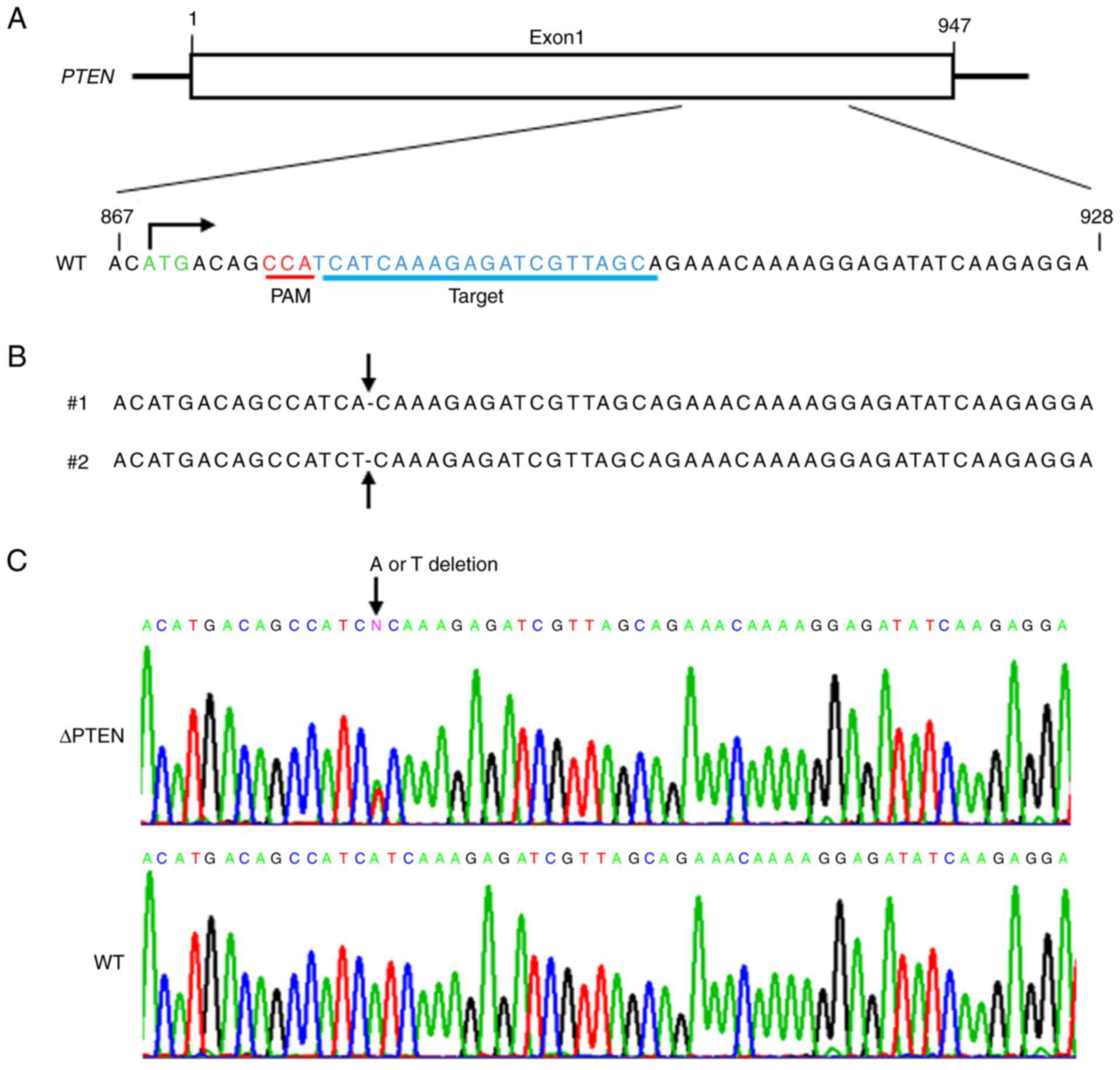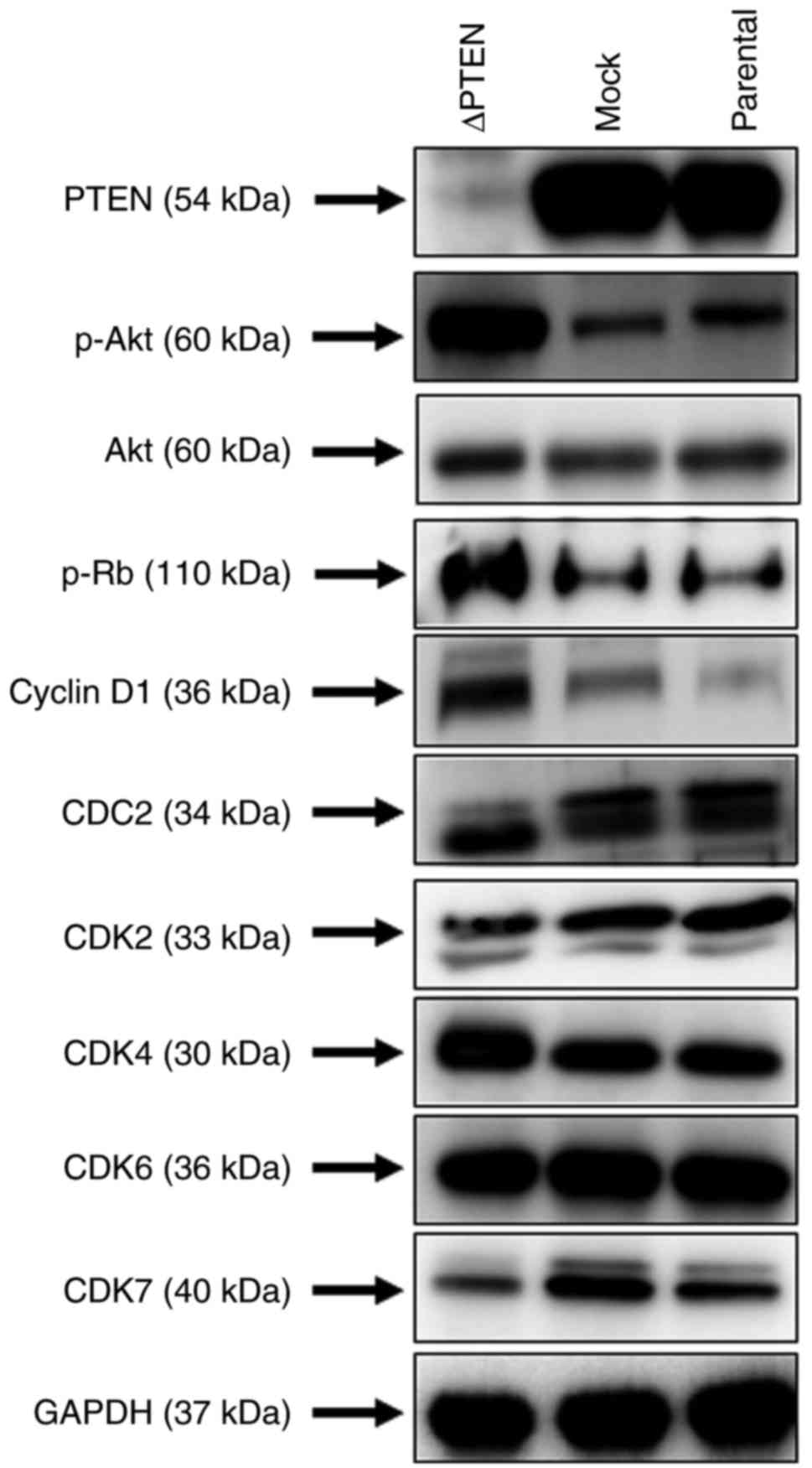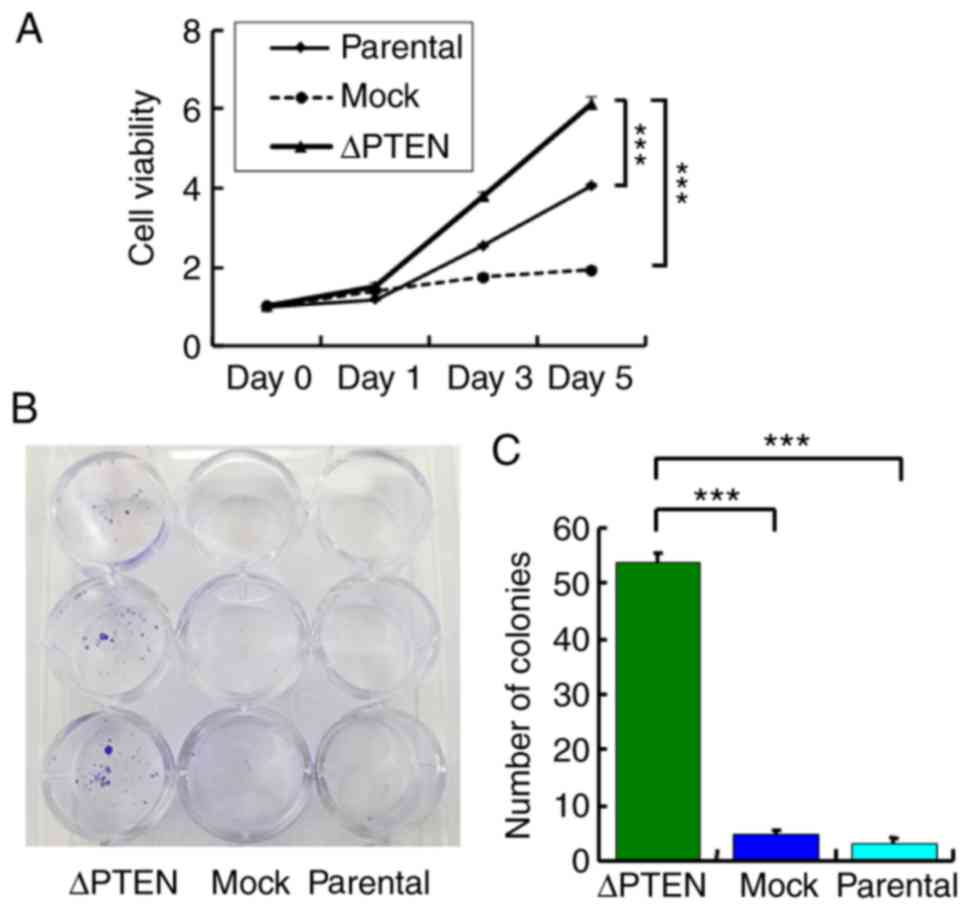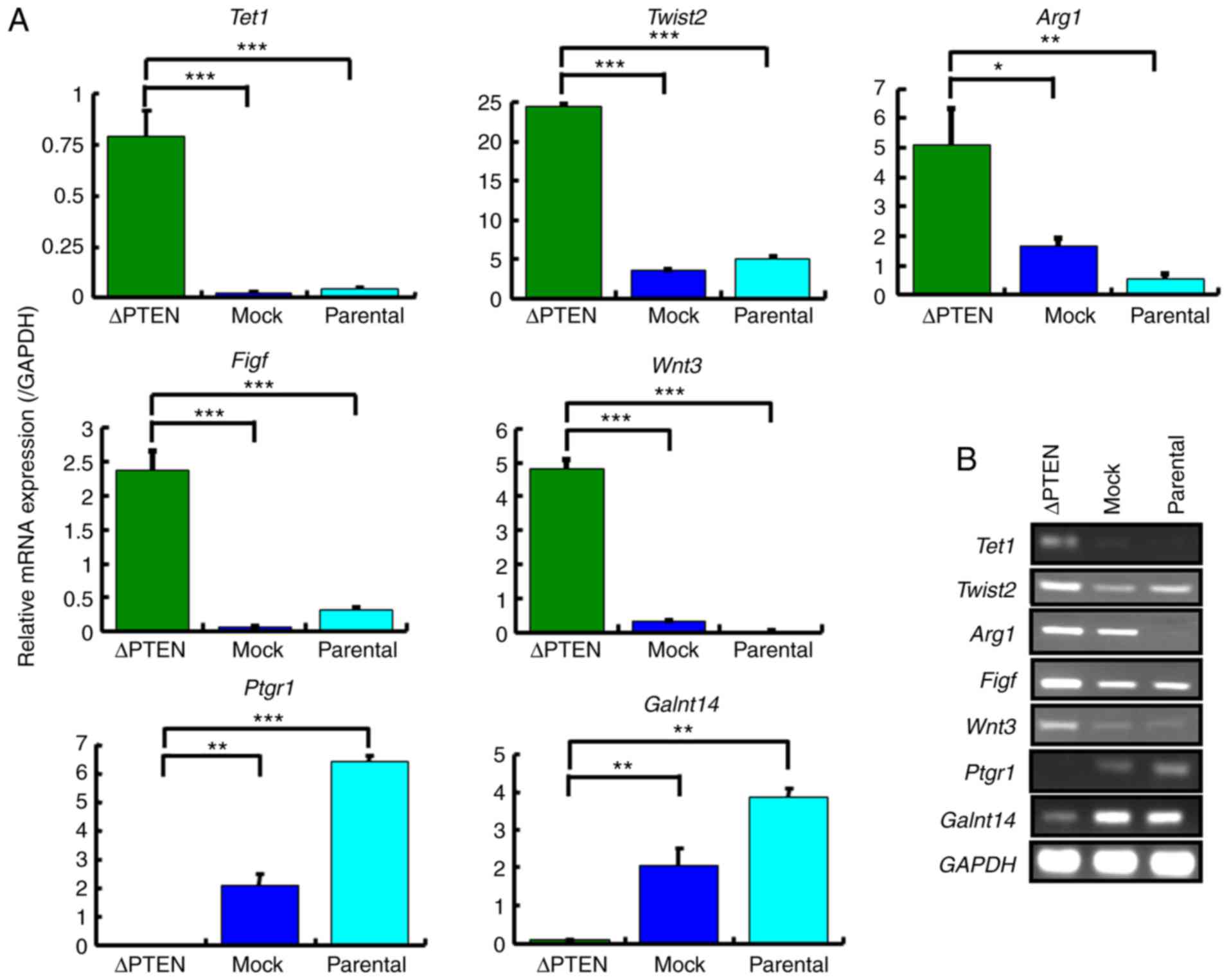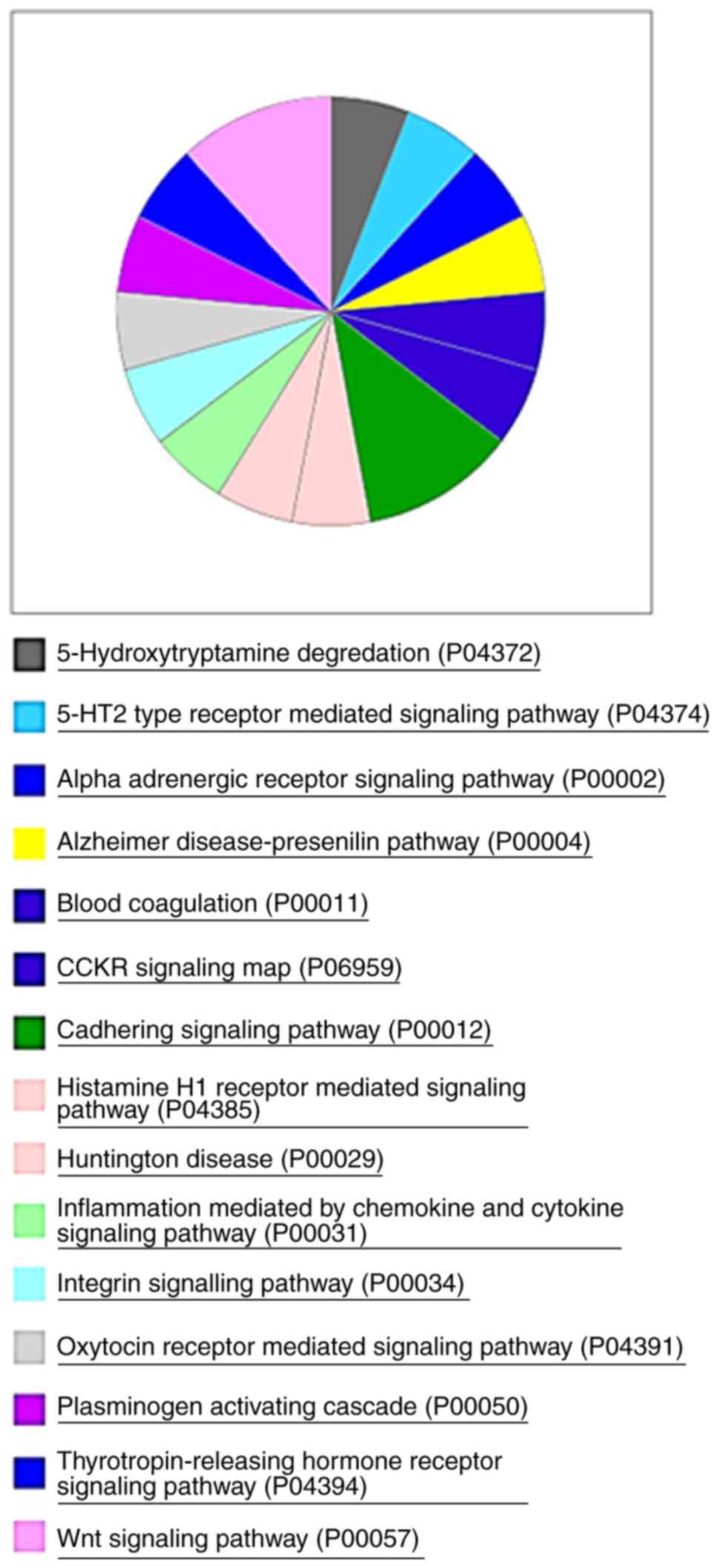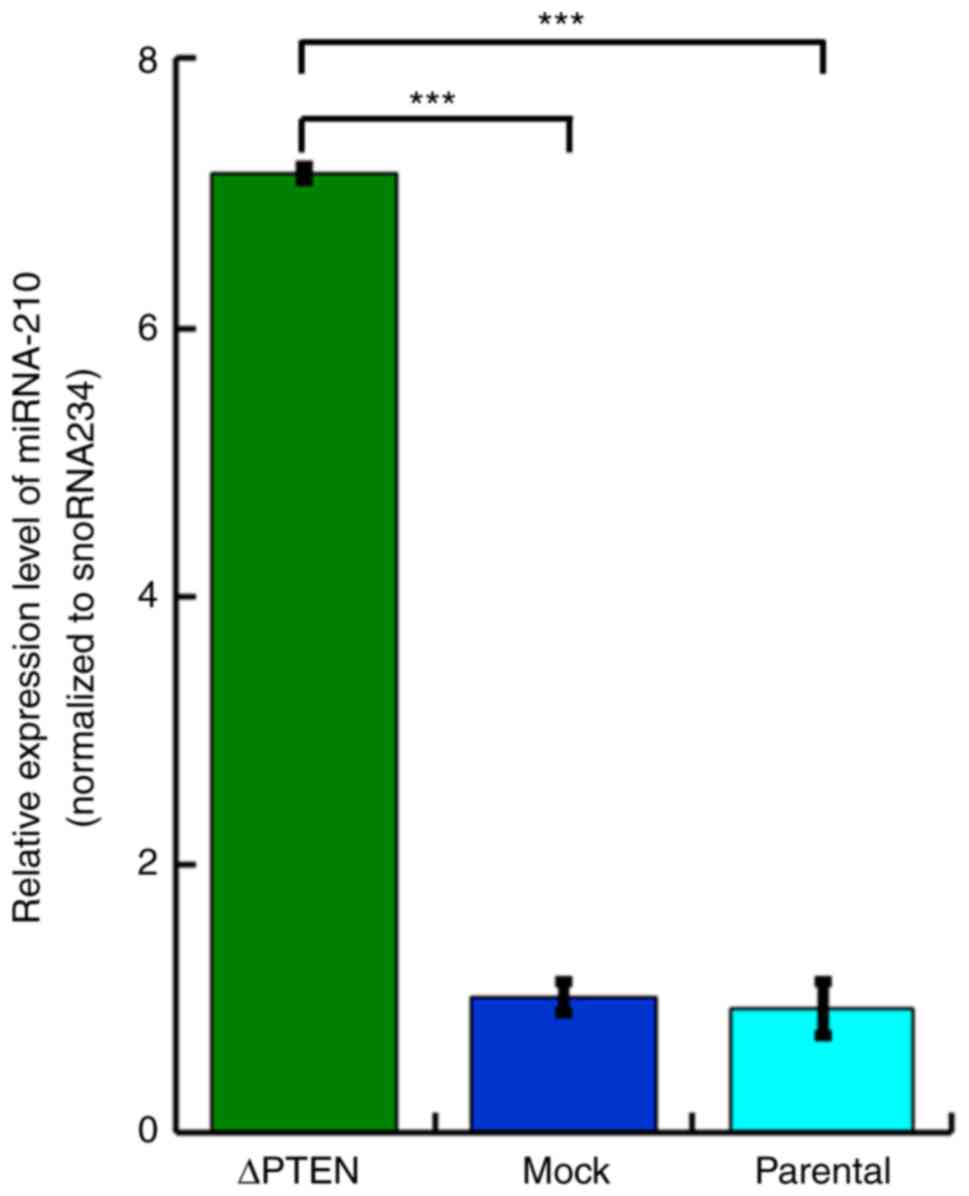|
1
|
Toker A and Cantley LC: Signalling through
the lipid products of phosphoinositide-3-OH kinase. Nature.
12:673–676. 1997. View
Article : Google Scholar
|
|
2
|
Li J, Yen C, Liaw D, Podsypanina K, Bose
S, Wang SI, Puc J, Miliaresis C, Rodgers L, McCombie R, et al:
PTEN, a putative protein tyrosine phosphatase gene mutated
in human brain, breast, and prostate cancer. Science. 28:1943–1947.
1997. View Article : Google Scholar
|
|
3
|
Steck PA, Pershouse MA, Jasser SA, Yung
WK, Lin H, Ligon AH, Langford LA, Baumgard ML, Hattier T, Davis T,
et al: Identification of a candidate tumour suppressor gene,
MMAC1, at chromosome 10q23.3 that is mutated in multiple
advanced cancers. Nat. Genet. 15:356–362. 1997. View Article : Google Scholar : PubMed/NCBI
|
|
4
|
Tamura M, Gu J, Matsumoto K, Aota S,
Parsons R and Yamada KM: Inhibition of cell migration, spreading,
and focal adhesions by tumor suppressor PTEN. Science.
280:1614–1617. 1998. View Article : Google Scholar : PubMed/NCBI
|
|
5
|
Yamada KM and Araki M: Tumor suppressor
PTEN: Modulator of cell signaling, growth, migration, and
apoptosis. J Cell Sci. 114:2375–2382. 2001.PubMed/NCBI
|
|
6
|
Waite KA and Eng C: Protean PTEN: Form and
function. Am J Hum Genet. 70:829–844. 2002. View Article : Google Scholar : PubMed/NCBI
|
|
7
|
McCall P, Witton CJ, Grimsley S, Nielsen
KV and Edwards J: Is PTEN loss associated with clinical outcome
measures in human prostate cancer? Br J Cancer. 99:1296–1301. 2008.
View Article : Google Scholar : PubMed/NCBI
|
|
8
|
Davies MA: Regulation, role, and targeting
of Akt in cancer. J Clin Oncol. 29:4715–4717. 2011. View Article : Google Scholar : PubMed/NCBI
|
|
9
|
Carnero A and Paramio JM: The
PTEN/PI3K/AKT pathway in vivo, cancer mouse models. Front Oncol.
4:2522014. View Article : Google Scholar : PubMed/NCBI
|
|
10
|
De Velasco MA, Tanaka M, Yamamoto Y,
Hatanaka Y, Koike H, Nishio K, Yoshikawa K and Uemura H: Androgen
deprivation induces phenotypic plasticity and promotes resistance
to molecular targeted therapy in a PTEN-deficient mouse
model of prostate cancer. Carcinogenesis. 35:2142–2153. 2014.
View Article : Google Scholar : PubMed/NCBI
|
|
11
|
Yamamoto Y, De Velasco MA, Kura Y, Nozawa
M, Hatanaka Y, Oki T, Ozeki T, Shimizu N, Minami T, Yoshimura K, et
al: Evaluation of in vivo responses of sorafenib therapy in a
preclinical mouse model of PTEN-deficient of prostate
cancer. J Transl Med. 8:1502015. View Article : Google Scholar
|
|
12
|
Koike H, Nozawa M, De Velasco MA, Kura Y,
Ando N, Fukushima E, Yamamoto Y, Hatanaka Y, Yoshikawa K, Nishio K
and Uemura H: Conditional PTEN-deficient mice as a prostate cancer
chemoprevention model. Asian Pac J Cancer Prev. 16:1827–1831. 2015.
View Article : Google Scholar : PubMed/NCBI
|
|
13
|
De Velasco MA, Kura Y, Yoshikawa K, Nishio
K, Davies BR and Uemura H: Efficacy of targeted AKT inhibition in
genetically engineered mouse models of PTEN-deficient
prostate cancer. Oncotarget. 29:15959–15976. 2016.
|
|
14
|
Jia L, Ji S, Maillet JC and Zhang X: PTEN
suppression promotes neurite development exclusively in
differentiating PC12 cells via PI3-kinase and MAP kinase signaling.
J Cell Biochem. 111:1390–1400. 2010. View Article : Google Scholar : PubMed/NCBI
|
|
15
|
Khan FA, Pandupuspitasari NS, Chun-Jie H,
Ao Z, Jamal M, Zohaib A, Khan FA, Hakim MR and Shujun Z:
CRISPR/Cas9 therapeutics: A cure for cancer and other genetic
diseases. Oncotarget. 7:52541–52552. 2016. View Article : Google Scholar : PubMed/NCBI
|
|
16
|
Ran FA, Hsu PD, Wright J, Agarwala V,
Scott DA and Zhang F: Genome engineering using the CRISPR-Cas9
system. Nat Protoc. 8:2281–2308. 2013. View Article : Google Scholar : PubMed/NCBI
|
|
17
|
Mizuno S, Hanamura I, Ota A, Karnan S,
Narita T, Ri M, Mizutani M, Goto M, Gotou M, Tsunekawa N, et al:
Overexpression of salivary-type amylase reduces the sensitivity to
bortezomib in multiple myeloma cells. Int J Hematol. 102:569–578.
2015. View Article : Google Scholar : PubMed/NCBI
|
|
18
|
Mi H, Huang X, Muruganujan A, Tang H,
Mills C, Kang D and Thomas PD: PANTHER version 11: Expanded
annotation data from Gene Ontology and Reactome pathways, and data
analysis tool enhancements. Nucleic Acids Res. 45:D183–D189. 2017.
View Article : Google Scholar : PubMed/NCBI
|
|
19
|
Livak KJ and Schmittgen TD: Analysis of
relative gene expression data using real-time quantitative PCR and
the 2−ΔΔCT method. Methods. 25:402–408. 2001.
View Article : Google Scholar : PubMed/NCBI
|
|
20
|
Ito S, D'Alessio AC, Taranova OV, Hong K,
Sowers LC and Zhang Y: Role of Tet proteins in 5mC to 5hmC
conversion, ES cell self renewal and inner cell mass specification.
Nature. 26:1129–1133. 2010. View Article : Google Scholar
|
|
21
|
Gawlik-Rzemieniewska N and Bednarek I: The
role of NANOG transcriptional factor in the development of
malignant phenotype of cancer cells. Cancer Biol Ther. 17:1–10.
2016. View Article : Google Scholar : PubMed/NCBI
|
|
22
|
Gasparotto D, Polesel J, Marzotto A,
Colladel R, Piccinin S, Modena P, Grizzo A, Sulfaro S, Serraino D,
Barzan L, et al: Overexpression of TWIST2 correlates with poor
prognosis in head and neck squamous cell carcinomas. Oncotarget.
2:1165–1175. 2011. View Article : Google Scholar : PubMed/NCBI
|
|
23
|
Li Y, Wang W, Wang W, Yang R, Wang T, Su
T, Weng D, Tao T, Li W, Ma D, et al: Correlation of TWIST2
up-regulation and epithelial-mesenchymal transition during
tumorigenesis and progression of cervical carcinoma. Gynecol Oncol.
124:112–118. 2012. View Article : Google Scholar : PubMed/NCBI
|
|
24
|
Mao Y, Xu J, Song G and Yin H: Twist2
promotes ovarian cancer cell survival through activation of Akt.
Oncol Lett. 6:169–174. 2013. View Article : Google Scholar : PubMed/NCBI
|
|
25
|
Yang MH, Wu MZ, Chiou SH, Chen PM, Chang
SY, Liu CJ, Teng SC and Wu KJ: Direct regulation of TWIST by
HIF-1alpha promotes metastasis. Nat Cell Biol. 10:295–305. 2008.
View Article : Google Scholar : PubMed/NCBI
|
|
26
|
Yamada Y, Nezu J, Shimane M and Hirata Y:
Molecular cloning of a novel vascular endothelial growth factor,
VEGF-D. Genomics. 42:483–488. 1997. View Article : Google Scholar : PubMed/NCBI
|
|
27
|
Achen MG, Jeltsch M, Kukk E, Mäkinen T,
Vitali A, Wilks AF, Alitalo K and Stacker SA: Vascular endothelial
growth factor D (VEGF-D) is a ligand for the tyrosine kinases VEGF
receptor 2 (Flk1) and VEGF receptor 3 (Flt4). Proc Natl Acad Sci
USA. 95:548–553. 1998. View Article : Google Scholar : PubMed/NCBI
|
|
28
|
Trompezinski S, Berthier-Vergnes O, Denis
A, Schmitt D and Viac J: Comparative expression of vascular
endothelial growth factor family members, VEGF-B, -C and -D, by
normal human keratinocytes and fibroblasts. Exp Dermatol.
13:198–105. 2004. View Article : Google Scholar
|
|
29
|
Debinski W, Slagle-Webb B, Achen MG,
Stacker SA, Tulchinsky E, Gillespie GY and Gibo DM: VEGF-D is an
X-linked/AP-1 regulated putative onco-angiogen in human
glioblastoma multiforme. Mol Med. 7:598–608. 2001. View Article : Google Scholar : PubMed/NCBI
|
|
30
|
Achen MG, Williams RA, Minekus MP,
Thornton GE, Stenvers K, Rogers PA, Lederman F, Roufail S and
Stacker SA: Localization of vascular endothelial growth factor-D in
malignant melanoma suggests a role in tumour angiogenesis. J
Pathol. 193:147–154. 2001. View Article : Google Scholar : PubMed/NCBI
|
|
31
|
White JD, Hewett PW, Kosuge D, McCulloch
T, Enholm BC, Carmichael J and Murray JC: Vascular endothelial
growth factor-D expression is an independent prognostic marker for
survival in colorectal carcinoma. Cancer Res. 62:1669–1675.
2002.PubMed/NCBI
|
|
32
|
Nakamura Y, Yasuoka H, Tsujimoto M, Yang
Q, Imabun S, Nakahara M, Nakao K, Nakamura M, Mori I and Kakudo K:
Prognostic significance of vascular endothelial growth factor D in
breast carcinoma with longterm follow-up. Clin Cancer Res.
9:716–721. 2003.PubMed/NCBI
|
|
33
|
Van Trappen PO, Steele D, Lowe DG, Baithun
S, Beasley N, Thiele W, Weich H, Krishnan J, Shepherd JH, Pepper
MS, et al: Expression of vascular endothelial growth factor
(VEGF)-C and VEGF-D, and their receptor VEGFR-3, during different
stages of cervical carcinogenesis. J Pathol. 201:544–554. 2003.
View Article : Google Scholar : PubMed/NCBI
|
|
34
|
Tian T, Nan KJ, Wang SH, Liang X, Lu CX,
Guo H, Wang W and Ruan ZP: PTEN regulates angiogenesis and VEGF
expression through phosphatase-dependent and -independent
mechanisms in HepG2 cells. Carcinogenesis. 31:1211–1219. 2010.
View Article : Google Scholar : PubMed/NCBI
|
|
35
|
Kaushal V, Mukunyadzi P, Dennis RA, Siegel
ER, Johnson DE and Kohli M: Stage-specific characterization of the
vascular endothelial growth factor axis in prostate cancer:
Expression of lymphangiogenic markers is associated with
advanced-stage disease. Clin Cancer Res. 11:584–593.
2005.PubMed/NCBI
|
|
36
|
Netto GJ: Molecular updates in prostate
cancer. Surg Pathol. 8:561–580. 2015. View Article : Google Scholar
|
|
37
|
Clevers H: Wnt/beta-catenin signaling in
development and disease. Cell. 127:469–480. 2006. View Article : Google Scholar : PubMed/NCBI
|
|
38
|
He S, Lu Y, Liu X, Huang X, Keller ET,
Qian CN and Zhang J: Wnt3a: Functions and implications in cancer.
Chin J Cancer. 34:554–562. 2015. View Article : Google Scholar : PubMed/NCBI
|
|
39
|
Wang HS, Nie X, Wu RB, Yuan HW, Ma YH, Liu
XL, Zhang JY, Deng XL, Na Q, Jin HY, et al: Downregulation of human
Wnt3 in gastric cancer suppresses cell proliferation and induces
apoptosis. Onco Targets Ther. 27:3849–3860. 2016. View Article : Google Scholar
|
|
40
|
Nakashima N, Liu D, Huang CL, Ueno M,
Zhang X and Yokomise H: Wnt3 gene expression promotes tumor
progression in non-small cell lung cancer. Lung Cancer. 76:228–234.
2012. View Article : Google Scholar : PubMed/NCBI
|
|
41
|
Xing Z, Wang HY, Su WY, Liu YF, Wang XX,
Zhan P, Lv TF and Song Y: Wnt3 knockdown sensitizes human non-small
cell type lung cancer (NSCLC) cells to cisplatin via regulating the
cell proliferation and apoptosis. Eur Rev Med Pharmacol Sci.
22:1323–1332. 2018.PubMed/NCBI
|
|
42
|
Kim M, Lee HC, Tsedensodnom O, Hartley R,
Lim YS, Yu E, Merle P and Wands JR: Functional interaction between
Wnt3 and Frizzled-7 leads to activation of the Wnt/beta-catenin
signaling pathway in hepatocellular carcinoma cells. J Hepatol.
48:780–791. 2008. View Article : Google Scholar : PubMed/NCBI
|
|
43
|
Nambotin SB, Tomimaru Y, Merle P, Wands JR
and Kim M: Functional consequences of WNT3/Frizzled7-mediated
signaling in non-transformed hepatic cells. Oncogenesis.
22:e312012. View Article : Google Scholar
|
|
44
|
Zhang J, Gill AJ, Issacs JD, Atmore B,
Johns A, Delbridge LW, Lai R and McMullen TP: The Wnt/β-catenin
pathway drives increased cyclin D1 levels in lymph node metastasis
in papillary thyroid cancer. Hum Pathol. 43:1044–1050. 2012.
View Article : Google Scholar : PubMed/NCBI
|
|
45
|
Bronte V and Zanovello P: Regulation of
immune responses by L-arginine metabolism. Nat Rev Immunol.
5:641–654. 2005. View Article : Google Scholar : PubMed/NCBI
|
|
46
|
Rodriguez PC, Quiceno DG, Zabaleta J,
Ortiz B, Zea AH, Piazuelo MB, Delgado A, Correa P, Brayer J,
Sotomayor EM, et al: Arginase I production in the tumor
microenvironment by mature myeloid cells inhibits T-cell receptor
expression and antigen-specific T-cell responses. Cancer Res.
64:5839–5849. 2004. View Article : Google Scholar : PubMed/NCBI
|
|
47
|
Boutard V, Havouis R, Fouqueray B,
Philippe C, Moulinoux JP and Baud L: Transforming growth factor-β
stimulates arginase activity in macrophages. Implications for the
regulation of macrophage cytotoxicity. J Immunol. 155:2077–2084.
1995.PubMed/NCBI
|
|
48
|
Morrison AC and Correll PH: Activation of
the stem cell derived tyrosine kinase/RON receptor tyrosine kinase
by macrophage-stimulating protein results in the induction of
arginase activity in murine peritoneal macrophages. J Immunol.
168:853–860. 2002. View Article : Google Scholar : PubMed/NCBI
|
|
49
|
Jost MM, Ninci E, Meder B, Kempf C, Van
Royen N, Hua J, Berger B, Hoefer I, Modolell M and Buschmann I:
Divergent effects of GM-CSF and TGFbeta1 on bone marrow-derived
macrophage arginase-1 activity, MCP-1 expression, and matrix
metalloproteinase-12: A potential role during arteriogenesis. FASEB
J. 17:2281–2283. 2003. View Article : Google Scholar : PubMed/NCBI
|
|
50
|
Qiu F, Huang J and Sui M: Targeting
arginine metabolism pathway to treat arginine-dependent cancers.
Cancer Lett. 364:1–7. 2015. View Article : Google Scholar : PubMed/NCBI
|
|
51
|
Fultang L, Vardon A, De Santo C and Mussai
F: Molecular basis and current strategies of therapeutic arginine
depletion for cancer. Int J Cancer. 139:501–509. 2016. View Article : Google Scholar : PubMed/NCBI
|
|
52
|
Huang X, Ding L, Bennewith KL, Tong RT,
Welford SM, Ang KK, Story M, Le QT and Giaccia AJ: Hypoxia
inducible mir-210 regulates normoxic gene expression involved in
tumor initiation. Mol Cell. 35:856–867. 2009. View Article : Google Scholar : PubMed/NCBI
|
|
53
|
Dang K and Myers KA: The role of
hypoxia-induced miR-210 in cancer progression. Int J Mol Sci.
16:6353–6372. 2015. View Article : Google Scholar : PubMed/NCBI
|
|
54
|
Ying Q, Liang L, Guo W, Zha R, Tian Q,
Huang S, Yao J, Ding J, Bao M, Ge C, et al: Hypoxia-inducible
microRNA-210 augments the metastatic potential of tumor cells by
targeting vacuole membrane protein 1 in hepatocellular carcinoma.
Hepatology. 54:2064–2075. 2011. View Article : Google Scholar : PubMed/NCBI
|















